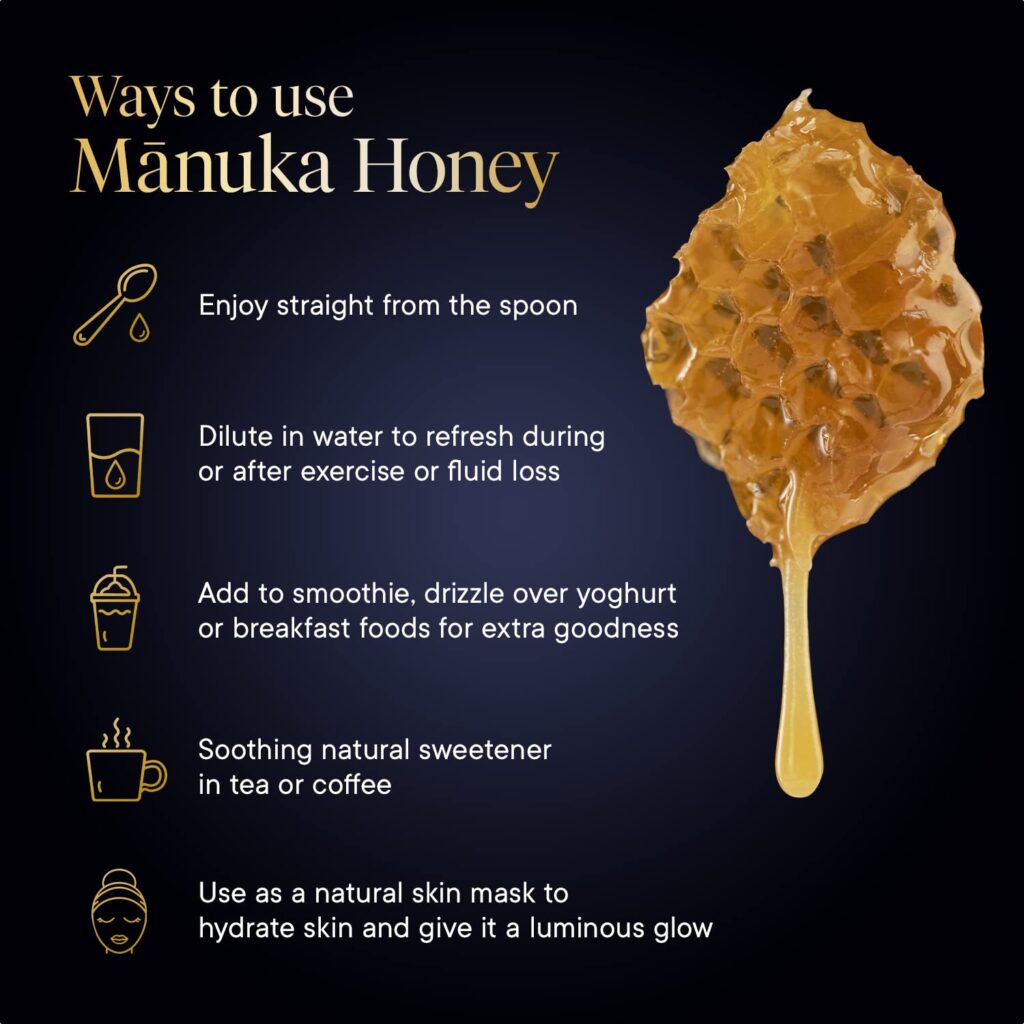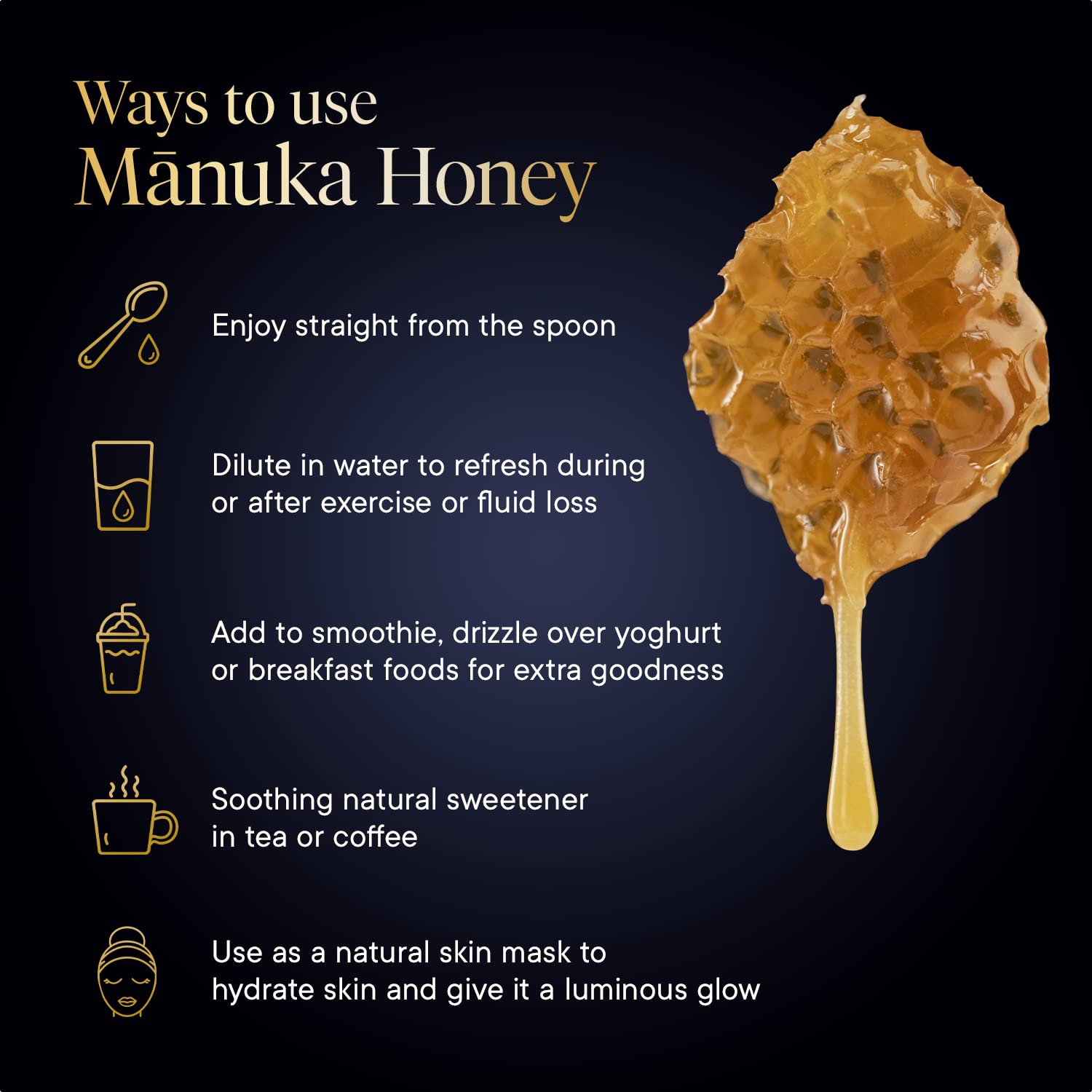
Manuka honey, hailed as a natural wonder, is gaining popularity for its abundant health benefits. This golden nectar, derived from the manuka flower found exclusively in New Zealand, has been cherished for centuries due to its potent healing properties. Packed with antioxidants, antibacterial qualities, and an array of essential nutrients, manuka honey is believed to boost your immune system, aid in digestion, soothe a sore throat, and even promote wound healing. Discover the endless possibilities and embrace the wonders of this organic treasure, as you taste the sweet benefits it has to offer.
What is Manuka Honey?
Manuka honey is a special type of honey that is derived from the nectar of the Manuka tree (Leptospermum scoparium) native to New Zealand and parts of Australia. It is known for its unique characteristics and properties that set it apart from regular honey.
Definition and origin
Manuka honey is a monofloral honey, meaning it is predominantly made from the nectar of a single plant species, in this case, the Manuka tree. The production of Manuka honey is a labor-intensive process that involves the careful collection and extraction of honey directly from beehives located in wooded areas with an abundance of Manuka trees.
The origin of Manuka honey can be traced back to the Maori people of New Zealand, who have long recognized its medicinal properties and used it as a natural remedy for various ailments. It has since gained popularity worldwide for its health benefits and unique taste.
What makes it different from regular honey?
What sets Manuka honey apart from regular honey is its high concentration of bioactive compounds. These compounds, most notably methylglyoxal (MGO), give Manuka honey its potent antibacterial and antimicrobial properties. Regular honey, on the other hand, contains lower levels of these beneficial compounds.
Manuka honey is also renowned for its unique floral aroma and rich, earthy flavor. Its texture is thicker and more viscous compared to regular honey, with a creamy consistency that melts in your mouth. This distinctive taste profile makes it a favorite among honey enthusiasts and culinary enthusiasts alike.
Unique characteristics and properties
One of the key factors that make Manuka honey so special is its high levels of MGO. MGO is a naturally occurring compound found in Manuka nectar, and it has been extensively studied for its antibacterial and anti-inflammatory properties. The higher the MGO content, the greater the potency and therapeutic effects of the Manuka honey.
In addition to MGO, Manuka honey also contains other beneficial compounds such as hydrogen peroxide and flavonoids, which contribute to its antimicrobial and antioxidant properties. These compounds work synergistically to boost the immune system, promote wound healing, and provide various other health benefits.
Another unique characteristic of Manuka honey is its ability to retain its potency even when exposed to heat, light, and enzymatic activity. This makes it highly stable and ensures that its beneficial properties remain intact, making it a reliable choice for both topical and internal use.
Health Benefits of Manuka Honey
Manuka honey has been used for centuries due to its numerous health benefits. Let’s explore some of the remarkable ways this natural and organic honey can improve your well-being.
Boosts the immune system
One of the most significant health benefits of Manuka honey is its ability to boost the immune system. The high levels of MGO and other bioactive compounds in Manuka honey stimulate the production of cytokines, which are essential for regulating immune responses. This helps strengthen your body’s defense against infections and illnesses.
Helps in wound healing
Manuka honey’s powerful antibacterial properties make it effective in treating wounds and promoting faster healing. Studies have shown that applying Manuka honey to cuts, burns, and ulcers can help prevent infections, reduce inflammation, and accelerate the healing process. Its ability to stimulate tissue regeneration also helps minimize scarring.
Soothes a sore throat
If you’re struggling with a sore throat, Manuka honey can be your natural remedy. Its antimicrobial properties help ease throat inflammation and soothe discomfort. You can simply take a spoonful of Manuka honey or mix it with warm water, lemon, and ginger for an extra boost of relief.
Promotes gut health
Manuka honey has been found to have prebiotic properties, meaning it can promote the growth of beneficial bacteria in the gut. This helps maintain a healthy balance of gut microbiota, which is crucial for optimal digestion, nutrient absorption, and overall gut health.
Anti-inflammatory properties
Chronic inflammation is linked to various health conditions, including heart disease, arthritis, and certain types of cancer. Manuka honey’s potent anti-inflammatory properties can help reduce inflammation in the body and alleviate symptoms associated with inflammatory disorders.
Effective in fighting bacteria
Unlike regular honey, Manuka honey exhibits strong antibacterial activity against a wide range of bacteria, including antibiotic-resistant strains. It can be used topically to treat bacterial skin infections or taken orally to combat bacterial infections in the gut or respiratory system.
Potential anti-cancer properties
While further research is needed, preliminary studies suggest that Manuka honey may have anticancer properties. Certain compounds present in Manuka honey have shown inhibitory effects on cancer cell growth and metastasis. However, more research is required to fully understand the potential of Manuka honey in cancer prevention and treatment.
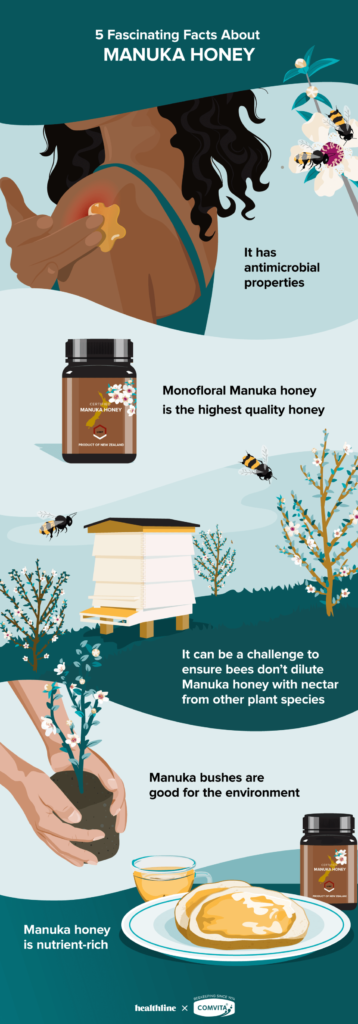
Manuka Honey for Skincare
In addition to its internal health benefits, Manuka honey is also a prized ingredient in skincare products. Its natural moisturizing properties, antioxidant effects, and ability to address various skin concerns have made it a popular choice for those seeking a natural and organic approach to skincare.
Natural moisturizer
Manuka honey is an excellent natural moisturizer that helps hydrate and nourish the skin. It acts as a humectant, drawing moisture into the skin and preventing dehydration. Its thick consistency forms a protective barrier on the skin’s surface, locking in moisture and promoting a healthy complexion.
Antioxidant and anti-aging effects
Free radicals caused by environmental factors such as UV rays and pollution can damage the skin and accelerate the aging process. The antioxidants found in Manuka honey help neutralize these harmful free radicals, reducing oxidative stress and preventing premature aging of the skin. Regular use of Manuka honey can help maintain a youthful and radiant complexion.
Treatment for acne and blemishes
Manuka honey’s antibacterial and anti-inflammatory properties make it an effective treatment for acne and blemishes. It helps eliminate acne-causing bacteria, reduce inflammation, and soothe irritated skin. Applying a small amount of Manuka honey directly to the affected area or using skincare products containing Manuka honey can help clear up acne and prevent future breakouts.
Soothes skin irritation and inflammation
If you’re dealing with irritated or inflamed skin conditions such as eczema, psoriasis, or rosacea, Manuka honey can provide relief. Its anti-inflammatory properties help calm redness, reduce itching, and alleviate discomfort associated with these skin conditions. A gentle application of Manuka honey to the affected areas can significantly improve the overall condition of your skin.
Promotes wound healing and scar reduction
Due to its antibacterial properties and ability to stimulate tissue regeneration, Manuka honey is highly effective in promoting wound healing and reducing the appearance of scars. Applying Manuka honey directly to wounds or using products containing Manuka honey can accelerate the healing process, minimize scarring, and improve the overall appearance of the skin.
Digestive Benefits of Manuka Honey
Beyond its external use, Manuka honey also offers several digestive benefits that can support a healthy gut and alleviate certain digestive disorders.
Treatment for digestive disorders
Manuka honey has long been used as a natural remedy for digestive disorders such as gastritis, indigestion, and gastric ulcers. Its antibacterial properties help combat Helicobacter pylori, a bacteria that can cause stomach ulcers and contribute to digestive problems. Consuming Manuka honey, either on its own or mixed with warm water, can help soothe the digestive system and promote healing.
Relief from acid reflux
For individuals suffering from acid reflux or heartburn, Manuka honey can provide relief. Its alkaline properties help neutralize excess stomach acid and reduce the intensity of acid reflux symptoms. Taking a teaspoon of Manuka honey before meals or as needed can help alleviate discomfort and support better digestion.
Assists in reducing stomach ulcers
Manuka honey’s antibacterial and anti-inflammatory properties make it an effective aid in reducing stomach ulcers. The presence of MGO in Manuka honey helps kill H. pylori bacteria and promote healing of the stomach lining. Regular consumption of Manuka honey, in consultation with a healthcare professional, can assist in reducing the severity and frequency of stomach ulcers.
Supports a healthy gut microbiota
Maintaining a healthy balance of gut bacteria is crucial for overall digestive health. Manuka honey’s prebiotic properties provide nourishment for beneficial gut bacteria, promoting a diverse and healthy gut microbiota. Incorporating Manuka honey into your diet can help support good gut health and promote efficient digestion.
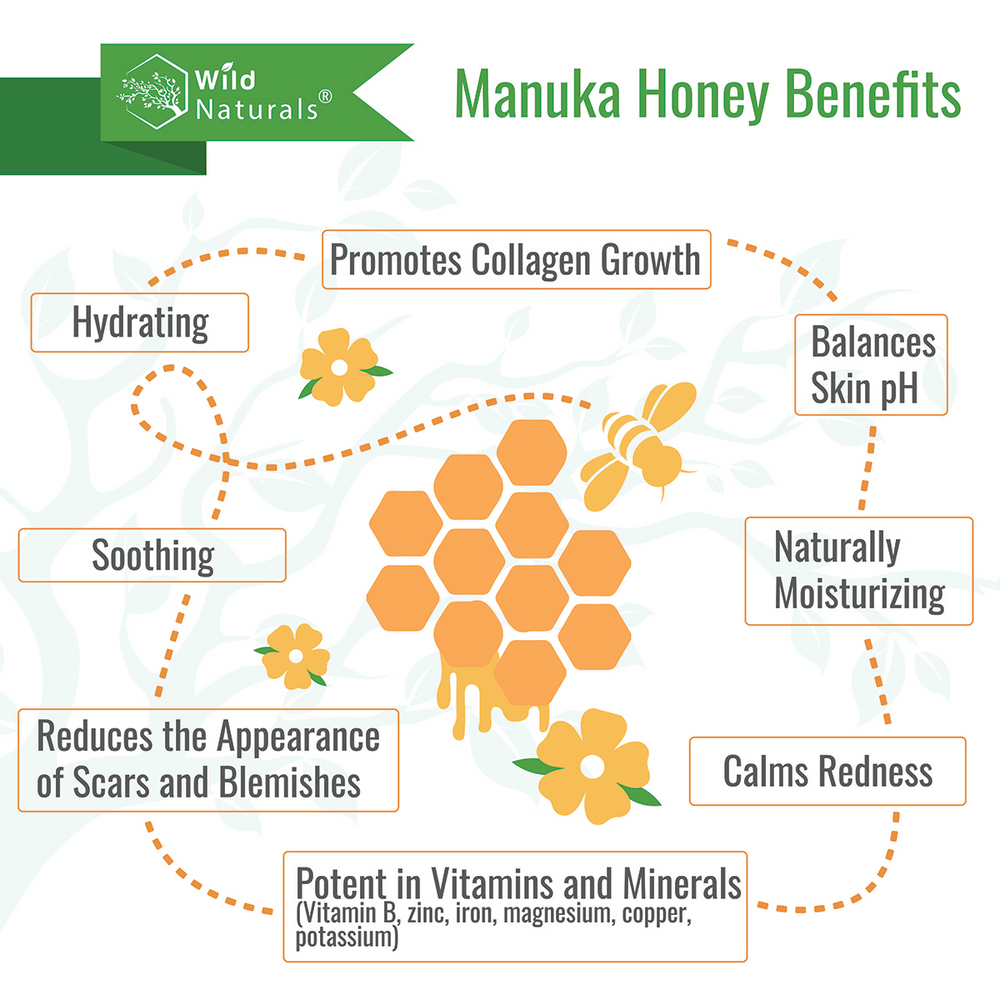
Manuka Honey and Oral Health
The unique properties of Manuka honey make it a valuable addition to your oral care routine. Its antimicrobial and healing properties can benefit various aspects of oral health.
Fights oral bacteria and gum disease
The antimicrobial properties of Manuka honey make it effective in fighting oral bacteria that can cause gum disease, tooth decay, and bad breath. Regular use of Manuka honey as a mouthwash or toothpaste ingredient can help maintain a healthy oral flora and minimize the risk of developing gum infections.
Natural remedy for bad breath
Bad breath, also known as halitosis, can be embarrassing and socially distressing. Manuka honey’s antibacterial properties help combat the bacteria that contribute to bad breath, providing a natural and effective remedy. Gargling with a mixture of Manuka honey and warm water can freshen breath and improve oral hygiene.
Helps prevent tooth decay and cavities
Manuka honey’s ability to inhibit the growth of Streptococcus mutans, the bacteria responsible for tooth decay, makes it a valuable ally in preventing cavities. Incorporating Manuka honey into your oral care routine or opting for toothpaste containing Manuka honey can help protect your teeth and maintain good oral health.
Promotes oral wound healing
If you’ve undergone oral surgery or are dealing with mouth ulcers, Manuka honey can aid in the healing process. Its antibacterial and anti-inflammatory properties soothe and protect damaged oral tissue, reducing pain and accelerating the healing of wounds. Applying a small amount of Manuka honey to the affected area can provide relief and promote faster recovery.
Different UMF Ratings Explained
When shopping for Manuka honey, you may come across various Unique Manuka Factor (UMF) ratings. These ratings indicate the quality and potency of the Manuka honey, helping you make an informed choice.
Understanding Unique Manuka Factor (UMF)
The Unique Manuka Factor (UMF) is a grading system that assesses the antibacterial activity and quality of Manuka honey. It measures the concentration of MGO, leptosperin, and dihydroxyacetone (DHA) in the honey, which are indicators of its antibacterial potency. The higher the UMF rating, the greater the concentration of these beneficial compounds and the stronger the honey’s medicinal properties.
Indications of quality and potency
UMF ratings serve as an indicator of the quality and potency of Manuka honey. The presence of a UMF rating ensures that the honey has been independently tested and meets specific criteria for antibacterial activity. UMF-certified Manuka honey guarantees the presence of the bioactive compounds responsible for its health benefits.
UMF 10+, UMF 15+, UMF 20+: What do they mean?
The UMF scale ranges from 0 to 30+, with higher values indicating higher levels of antibacterial activity. Manuka honey with a UMF rating of 10+ is considered the minimum required for therapeutic benefits. UMF 15+ is recognized as a superior quality honey, while UMF 20+ and above represent the highest grade of Manuka honey available, offering the most potent and powerful effects.
It’s essential to choose a UMF rating that aligns with your specific needs and desired health benefits. If you’re using Manuka honey for general wellness purposes, UMF 10+ or 15+ may suffice. However, if you’re looking for a more potent and targeted treatment, UMF 20+ or higher may be the right choice for you.

How to Identify Genuine Manuka Honey
Given the increasing popularity of Manuka honey, it is crucial to ensure that you are purchasing a genuine and authentic product. Here are some factors to consider when identifying genuine Manuka honey.
Certifications and regulatory standards
Look for Manuka honey that carries recognized certifications, such as the Unique Manuka Factor (UMF) certification or the Methylglyoxal (MGO) certification. These certifications guarantee that the honey has undergone rigorous testing and meets the highest industry standards for quality and authenticity.
The importance of UMF and MGO ratings
The UMF and MGO ratings on the product label serve as indicators of the honey’s quality and potency. Genuine Manuka honey will clearly display these ratings, allowing you to assess its antibacterial activity and therapeutic benefits.
Verifying authenticity through testing
To ensure you are purchasing genuine Manuka honey, you can request a Certificate of Analysis (CoA) from the manufacturer or supplier. This document provides detailed information about the honey’s composition, including its UMF or MGO rating. Testing the honey yourself or through a reputable laboratory can also provide confirmation of its authenticity.
Recognizing fraudulent or adulterated products
Unfortunately, the popularity of Manuka honey has led to an increase in counterfeit and adulterated products. Beware of products that claim to be Manuka honey but do not provide sufficient information on their labels. Additionally, avoid honey with extremely low prices or those that do not carry recognized certifications, as these are likely to be fraudulent or of inferior quality.
Safety Considerations and Side Effects
While Manuka honey is generally safe for consumption, there are a few considerations to keep in mind for optimal usage and to minimize any potential side effects.
Allergic reactions and contraindications
Individuals with known allergies to bee products, such as honey, pollen, or bee venom, should exercise caution when using Manuka honey. It is essential to perform a patch test before applying Manuka honey topically to ensure there are no adverse reactions. If you experience any allergic symptoms, such as hives, itching, or difficulty breathing, discontinue use and seek medical advice.
Safe usage guidelines
When consuming Manuka honey for its health benefits, it is recommended to start with small quantities and gradually increase the dosage. This allows your body to adjust and minimizes the risk of gastrointestinal discomfort. For specific health concerns or if you are pregnant, breastfeeding, or have any underlying medical conditions, it is advisable to consult with a healthcare professional before using Manuka honey.
Possible risks and precautions
Although rare, there have been isolated cases of botulism linked to honey consumption, including Manuka honey. It is crucial to exercise caution when giving honey to infants under one year old, as their immune systems are not fully developed and are more susceptible to the bacteria that can cause botulism. Always follow pediatric guidelines and consult a healthcare professional if in doubt.
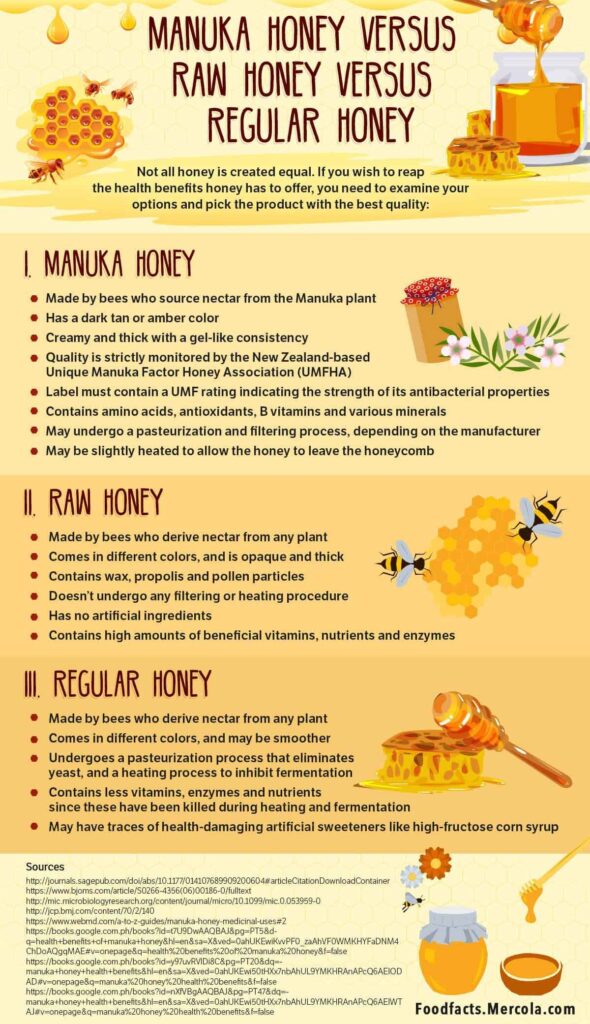
Culinary Uses of Manuka Honey
Apart from its numerous health benefits, Manuka honey can enhance the flavors in various recipes and serve as a healthier alternative sweetener.
Enhancing flavors in recipes
The rich and distinctive flavor profile of Manuka honey adds depth and complexity to a wide range of dishes. From glazing meats and vegetables to sweetening sauces and dressings, Manuka honey can transform ordinary recipes into culinary delights.
Alternative sweetener with added health benefits
Replacing refined sugar with Manuka honey is a delicious way to boost your health. Its natural sweetening properties make it an excellent substitute in tea, coffee, smoothies, and baked goods. The added health benefits of Manuka honey, such as its antibacterial and antioxidant properties, make it a wiser choice for those seeking a healthier and more nutritious option.
Manuka honey in baking, beverages, and marinades
Manuka honey’s versatility makes it perfect for use in baking, creating delectable treats like cakes, cookies, and energy bars. It also adds a unique touch to beverages, such as teas, cocktails, and homemade lemonades. Marinating meats or glazing roasted vegetables with Manuka honey can enhance their flavors and impart a delightful caramelized finish.
Sustainable and Ethical Manuka Honey Production
The production of Manuka honey involves the collaboration between the honeybees, beekeepers, and the Manuka trees. Sustainable and ethical practices are essential to ensure the long-term viability of this precious resource.
Environmental impact and conservation
Manuka trees play a vital role in supporting the production of Manuka honey. It is essential to preserve and protect the natural habitats of these trees to maintain their health and sustainable growth. Responsible beekeeping practices, including minimizing hive disturbance and protecting pollinator populations, contribute to the preservation of the delicate balance between bees and their environments.
Supporting beekeeping communities
The production of Manuka honey supports beekeeping communities in New Zealand and Australia, contributing to local economies and livelihoods. By choosing genuine Manuka honey from reputable producers, you are directly supporting these beekeepers and their commitment to sustainable and ethical honey production.
Importance of sustainable sourcing
When selecting Manuka honey products, look for manufacturers and suppliers that prioritize sustainable sourcing practices. This includes responsible harvesting of honey and adhering to ethical standards throughout the production process. By supporting sustainable sourcing, you are helping to protect the delicate ecosystems and ensure the future availability of Manuka honey.
Certifications for ethical production
Various certifications, such as Fair Trade and organic certifications, serve as proof of sustainable and ethical honey production. These certifications ensure that the honey has been produced without the use of harmful chemicals, in compliance with environmental standards, and under fair labor practices. Choosing products with recognized certifications is a reliable way to support and promote ethical honey production.
Manuka Honey Organic.
